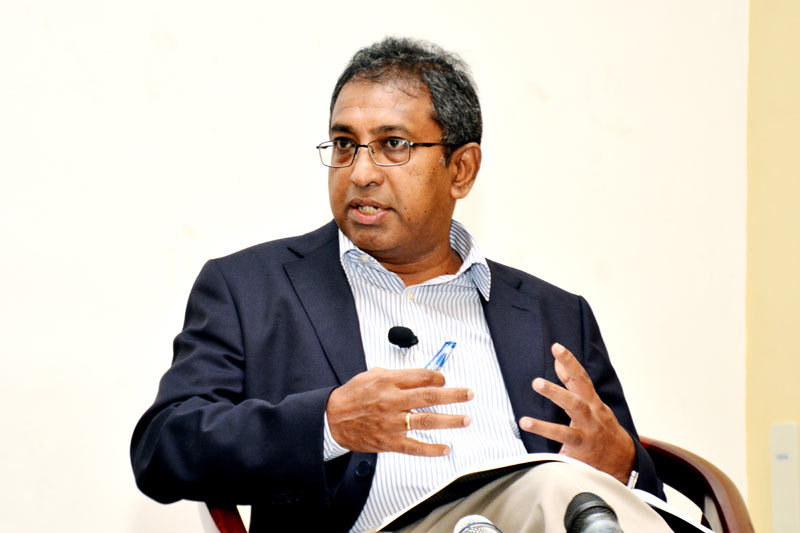Thursday Feb 19, 2026
Thursday Feb 19, 2026
Monday, 6 November 2023 00:20 - - {{hitsCtrl.values.hits}}

Dr. Harsha de Silva - Pic by Upul Abayasekara
A recent event organised by Harsha de Silva’s team, titled “Insights with Harsha: Smart Policies & Economic Revival,” brought to light key policy discussions essential for Sri Lanka’s economic revitalisation.
During the event MP Harsha de Silva, Chairman of COPF, addressed critical issues, starting with the pressing need for tax reform. He highlighted that tax revenue currently stands at only 8% of GDP, a stark contrast to the 20% it once represented during President Premadasa’s time. Harsha emphasised the importance of revenue rationalisation while ensuring fairness in the tax system.
Another vital issue raised during the event was the adoption of cost-based tariffs or cost-reflective pricing. Harsha noted that this approach reduces government expenditure that would otherwise be used to support loss-making enterprises. He cited an example of the recent need for Rs. 231.5 billion to cover payments to CPC for fuel, illustrating how mispricing can place a burden on taxpayers.
The event also emphasised the need for reforms with a focus on empathy. Harsha’s vision is to instill hope in the youth by demonstrating that meaningful reforms can pave the way for a brighter future. He stressed the importance of committed leaders who understand the challenges faced by the younger generation.
Audience questions covered various topics, including demonetisation, VAT increases, the brain drain and the development of skilled labour. Harsha’s responses highlighted the need for growth, trade and investment policy reforms, as well as technology adoption to drive total factor productivity.
A notable point raised during the event was the need for Sri Lanka to invest in skills development, similar to the successful approach in Tamil Nadu. Harsha emphasised that to propel the nation forward, the workforce must be equipped with the right skills. Tamil Nadu’s 550 engineering schools at various levels produce the talent required by various industries, helping the state aspire to achieve a trillion-dollar GDP by 2030. This underscores the importance of nurturing a skilled labour force.
Harsha also touched upon the topic of demonetisation, drawing on India’s experience. He acknowledged both advantages and disadvantages but underscored the potential for transitioning towards a cashless and digital society through the adoption of e-wallets and digital identification systems like Aadhar. Harsha highlighted that achieving a cashless society should rely on regulation and incentives rather than abrupt demonetisation, driving Sri Lanka into a more digitised future.
Regarding protectionism and protectionist lobbies, Harsha advocated for a change in mindset, highlighting the importance of open trade agreements and knowledge transfer. He outlined the social market economy plan of the SJB and the significance of transparency, accountability, automation, and efficient tax administration in building a new social contract that renews hope.
Discussions also revolved around addressing the factors of production, land and labour. Harsha emphasised the need for a cadastral registry to enable a transparent marketplace for land transactions. Such a move would boost the land market’s efficiency and drive economic growth.
Harsha suggested re-evaluating the Termination of Workmen Act and exploring more progressive alternatives, considering the evolving nature of today’s business cycles and the incentives required to promote entrepreneurship. This will encourage entrepreneurs to take calculated risks. He also proposed implementing a transitional unemployment benefits scheme, funded jointly by the state and businesses. This mechanism would provide financial support during challenging economic periods, reducing the burden on employers.
The event concluded with Harsha’s vision to address the bloated state sector through measures such as golden handshakes, privatisation, and other key reforms. Harsha advocated reallocating resources to sectors vital for the nation’s development, noting that for a country not engaged in war, Sri Lanka maintains one of the highest per capita military budgets globally.
MP Harsha de Silva closed the event with a message of hope and the call to unite like-minded individuals for the betterment of Sri Lanka.
For more details on the policies discussed during the event, please refer to Harsha de Silva’s blueprint 2.0, and stay tuned for the upcoming blueprint 3.0, dedicated to fostering growth in Sri Lanka.